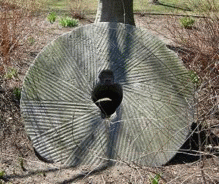
In your prayers today and in the coming weeks, please do pray for the hostages who remain missing and for those who have been returned to their families.
In recent months we have requested prayer following the kidnapping on Friday 12th June 2009 of nine foreigners in Saada, north-west Yemen, three of whom were murdered shortly afterwards. Recall that two were freed unharmed on 17th May.
There continues to be no news of Johannes and Sabine (a German couple), Simon (their son, aged 2) or of Tony (a British man). Lydia and Anna (5 and 4, daughters of Johannes and Sabine) who were freed in May are with relatives in Germany.
The Muslim fasting month of Ramadan started on Wednesday. Therefore, Johannes, Sabine and Tony (assuming they are alive) will probably be forced to fast during daylight hours, which are approximately 4:15 am to 6:30 pm in northern Yemen.
Christians in Yemen thank us for our prayers and request our continued intercession. Please pray that:
1. The missing four (assuming they are alive) will know the peace, presence and daily provision of Jesus and will be released unharmed shortly
2. They will lack nothing during Ramadan
3. Efforts by those seeking to secure their release will be successful
4. Lydia, Anna and their relatives will know the presence and peace of Jesus
5. The families and colleagues of those missing and murdered will know the peace of Jesus amidst continuing speculation and uncertainty
6. All expatriate Christians in Yemen will know the Lord’s guiding and protecting at this time
7. The perpetrators will be convicted by the Spirit and drawn to the forgiveness, love and true life offered by Jesus.




 Dora Lilia Saavedra and her husband, Ferley, spoke freely about Christ to the children they taught in Santana Ramos, a farming village deep in the Colombian jungle and a hotspot for guerrilla violence. Each day children ages six to 12 piled into Dora's one-room, wooden schoolhouse and listened to her talk about Jesus, but this was risky. She was luring more away from the guerrillas’ cause. Guerrillas also didn’t like Dora’s commitment to truth. “Christians are dangerous,” they repeatedly said. “Christians cannot lie. If the army asks them about us, they will tell the truth.”
Dora Lilia Saavedra and her husband, Ferley, spoke freely about Christ to the children they taught in Santana Ramos, a farming village deep in the Colombian jungle and a hotspot for guerrilla violence. Each day children ages six to 12 piled into Dora's one-room, wooden schoolhouse and listened to her talk about Jesus, but this was risky. She was luring more away from the guerrillas’ cause. Guerrillas also didn’t like Dora’s commitment to truth. “Christians are dangerous,” they repeatedly said. “Christians cannot lie. If the army asks them about us, they will tell the truth.”  After the neighbour’s warning, Dora and her husband had a final devotion with their three children. The couple spent all night praying and fasting.
After the neighbour’s warning, Dora and her husband had a final devotion with their three children. The couple spent all night praying and fasting. 


![India (Sep 2009) 368[4] India (Sep 2009) 368[4]](https://blogger.googleusercontent.com/img/b/R29vZ2xl/AVvXsEhoblvSNATtYmF5sqYicNeATjcw2M88WWZDxr7mN6c3DkyNUtI49vF02eq70glIaGFhnaKupppv7pc8jRGfcYaJk2OibvSoSL6znvbAC3ZNDkCSt9XwlyRjEIlH5jJEDdXkapJLgp_l44o8/?imgmax=800) It has been nearly two years since anti-Christian violence erupted in India's Orissa state. The attacks claimed the lives of approximately 100 Christians while dozens of church buildings and homes were destroyed (
It has been nearly two years since anti-Christian violence erupted in India's Orissa state. The attacks claimed the lives of approximately 100 Christians while dozens of church buildings and homes were destroyed ( A verdict of culpable homicide for two Indian men accused of killing a paralyzed Christian during anti-Christian riots in Orissa has disappointed Church people.
A verdict of culpable homicide for two Indian men accused of killing a paralyzed Christian during anti-Christian riots in Orissa has disappointed Church people.  Pradhan’s brother Ravinder also expressed dissatisfaction over the outcome of the case as the men were not convicted for murder. “There are other accused still to be arrested and prosecuted,” he said.
Pradhan’s brother Ravinder also expressed dissatisfaction over the outcome of the case as the men were not convicted for murder. “There are other accused still to be arrested and prosecuted,” he said. 







